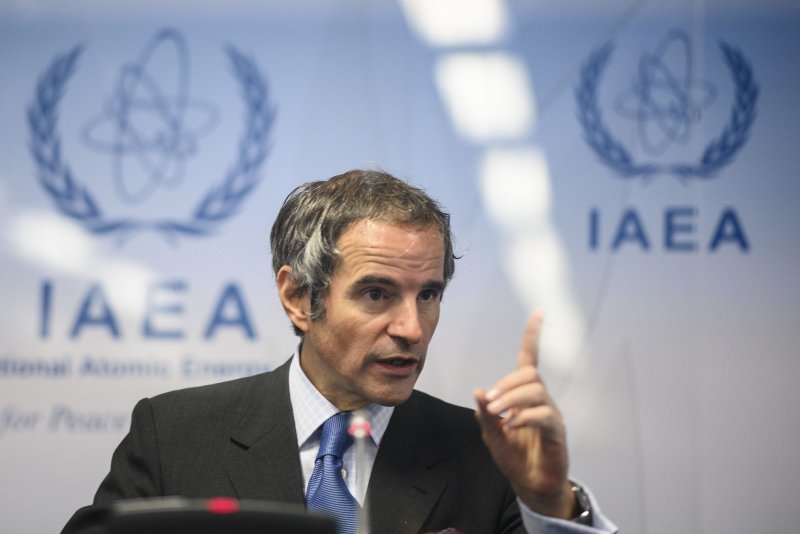Director General of the International Atomic Energy Agency Rafael Mariano Grossi attends a press conference during an IAEA Board of Governors meeting at the IAEA headquarters of the U.N. seat in Vienna, Austria, on Monday. Photo by Christian Bruna/EPA-EFE
June 7 (UPI) -- Days before Washington and Tehran are to meet for negotiations on resurrecting an Obama-era nuclear deal, the director of the international nuclear watchdog agency said Iran's lack of cooperation over the past few months prevents him from being able to assure the public that the Middle Eastern country is not building a nuclear weapon.
Speaking in Vienna on Monday before the U.N.'s International Atomic Energy Agency board, Director Rafael Marino Grossi said Iran has yet to provide it with answers and information concerning four undeclared sites where nuclear particles have been detected.
"The lack of progress in clarifying the agency's questions concerning the correctness and completeness of Iran's safeguards declarations seriously affects the ability of the agency to provide assurance of the peaceful nature of Iran's nuclear program," he told the board in his introductory remarks.
Grossi made the admission months after announcing he had reached a temporary deal with Iran in February to allow inspectors to maintain access to its nuclear activities after Tehran had vowed to stop implementing the IAEA's Additional Protocols amid a deepening conflict with the United States and the other signatories to the 2015 Joint Comprehensive Plan of Action that aimed to prevent Tehran from securing a nuclear weapon.
The JCPOA has continued to fray since 2018 when then-President Donald Trump pulled the United States from the nuclear accord and imposed sanctions against Iran, which retaliated by repeatedly reneging on its commitments to the deal.
Under the new Joe Biden presidency, the United States has said it will re-enter the accord if Iran returns to compliance with the sixth round of negotiations between the two sides to start Thursday.
However, Grossi told the IAEA on Monday that since the Feb. 23 deal that was expected to clear a path to resuming the 2015 nuclear accord, the agency's ability to verify and monitor Iran's activities have been hindered by Tehran's decision to stop implementing its JCPOA commitments, including the Additional Protocol.
He also said that the nuclear particles present at the four sites is a clear indication nuclear material or equipment containment by nuclear material has been present at those locations.
In his report to the board, he said Iran has not provided the agency with new information concerning one location and has not answered any of his questions or provided information about two other locations while providing him with a written statement concerning the fourth location without any substantiating documentation. Multiple uranium particles caused by human activity as well as isotopically altered particles were detected at three of the undeclared locations, he said.
"Iran has not provided the necessary explanation for the presence of the nuclear material particles at any of the three locations where the agency has conducted complementary accesses," he told the board. "In the absence of such an explanation from Iran, I am deeply concerned that nuclear material has been present at the three undeclared locations in Iran and that the current locations of this nuclear material are not known by the agency."
He told reporters during a press conference following the board meeting that his expectations with Iran were not met, but that Iran continues to state its want to work with the agency.
"I think it is important to recognize that Iran is not telling us they do not want to engage or that they don't want to talk. ... but at the same time talk must lead to conclusions, and this is the point I'm trying to make," he said. "Engaging is the prerequisite but the prerequisite for something."
"So my hope that these expressions of goodwill will be substantiated and will be underpinned by concrete deliverables," he said.















